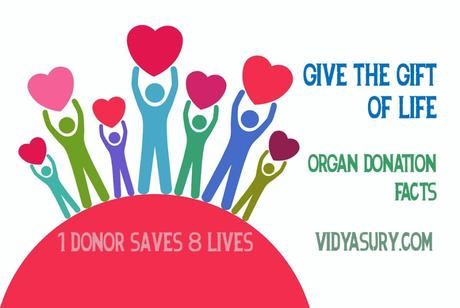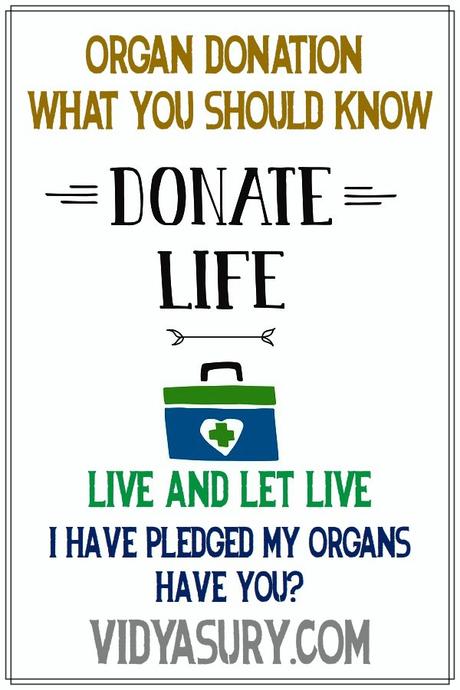
One of my Mom's fondest wishes was to donate her body to a medical college when she passed away. Every time she mentioned this, we'd nod along assuring her, yeah, we'd do it. Of course, we took no further action. Nobody expected her to pass away.
Then in Feb 2010, after being rushed to the hospital with a collapsed lung and put on life support for a week, she passed away unexpectedly and suddenly. Naturally, I wanted to carry out her wish. But how?
I panicked. I was in shock, yet hoped for a miracle to happen where we'd be able to respect her wish. I reached out to a family friend who had some contacts and in fifteen minutes, arrangements were made. That day will always be fresh in my mind. In the midst of our grief, we had the satisfaction that we were able to carry out Mom's wishes. So grateful for that.
Later, many of our friends applauded us for this "brave" act. Some scolded us for not going the organ donation route. You'll know why when you read on.
What is organ donation?
It is the process of procuring an organ from an alive or deceased person, also known as the donor. The process is called harvesting. Once harvested, the organ is transplanted into the recipient who needs the organ.
Organ donation can be of two types:
Live donations are from healthy, living people and this is done only for a liver or kidney, since the liver can regenerate to its normal proportions and an individual can survive with one kidney. Normally the immediate family is scouted for someone who needs a liver or a kidney.
The good news is, each one of us can donate our organs after our death, by pledging to do so as soon as we can. This would come under cadaver donation and is possible when the person has been declared brain dead. Brain death is when there is no brain stem reflex, no spontaneous respiration and no consciousness.
While most of us have a general idea about organ donation, there are specific facts everyone should know.

Ten facts about organ donation
- Not everyone can donate their organs after death. In case of cardiac death-heart stops beating-only tissues such as eyes, cornea, bones, veins, blood stem cells, blood and platelets, tendons, ligaments, cartilage, skin, heart valves and the whole body can be donated. Vital organs cannot be donated once the heart stops beating. In case of brain death, vital organs can be donated, as it is possible for organs to function, especially if the person is still on the ventilator. So, if the person dies at home or elsewhere, and their heart stops beating, they cannot donate their vital organs, as these organs die within minutes of the cardiac death. To summarize: vital organs can be donated only if the person is declared brain dead in a hospital.
- Brain death and coma are not the same. Coma is a state of deep consciousness with brain activity, where the person can breathe without a ventilator. Here the brain is likely to heal and the person can come out of the coma. Brain death happens following an injury such as an accident or stroke, causing permanent damage, resulting in brain death. Here, the person is declared dead. When this happens, a panel of doctors determine whether there is brain death and whether the organs can be harvested.
- Just about anyone from a newborn to a 95-year-old can donate organs and tissues. However, medical history matters. While those with cancer, HIV, or disease-causing bacteria in the blood or body tissue are usually overlooked as donors, there are instances where they can donate. Donor's time of death is important in relation to the organ's usability. In case of living donors, the process leading to donation is a deciding factor. What is amazing is, organ donation from one person after brain death can save up to nine lives and make life better for several others.
- Very few medical conditions disqualify one from being an organ or tissue donor.
- Families must decide within a certain time limit about donating the deceased's organs. After brain death, even if the person is on the ventilator, organs begin to fail. Ideally, the family should be aware of the intention to donate organs.
- Pledging to donate organs and holding a donor card is great, but at the time of death, organ donation cannot happen without the consent of the next of kin.
- The body is not disfigured or mutilated after organs are retrieved. The medical team makes a single incision, retrieves the organs through this, cleans the body and stitches it back and delivers the body back to the family in an intact condition.
- We all know that buying/selling human organs is illegal and punishable as per the Transplantation of Human Organs Act -1994
- The organ transplant waiting list at the hospital does not look at economic or celebrity status. Organs are distributed based on urgency of need, position on waiting list and blood type.
- Family does not have to bear any costs related to organ donation.
In India, brain deaths as a result of accidents amount to 150,000 per year. The total number of brain deaths due to accidents alone is nearly 1.5 lakhs annually. The estimate for organ donations is: 200,000 kidneys, 50000 hearts and 50000 livers each year. By harvesting even 5-10% of all brain deaths for organ donation, this need could be met. Statistics show that one person dies of kidney failure every five minutes, which means 290 deaths a day.
Did you know you can also donate skin? Read more about skin donation here.
Okay, moving on to the organs that CAN be donated...six human organs can be donated. And transplanted. These are:
KidneyA transplanted kidney has a lifespan of nine years. This organ is in high demand as people with kidney disease usually experience deterioration of both, and also, a living donor can manage with one kidney.
LiverMust be transplanted within 12 hours. The liver detoxes our system and has the special ability to regenerate itself. One liver can give life to two different people. And the liver of the donor who has a portion of the liver removed regenerates back to its original size.
HeartWhen removed from the donor's body, the heart that beats about 2.5 billion times during its lifetime has just four more hours before it can be transplanted.
LungsLiving donors can donate a portion of the lungs, but it does not regenerate like the liver. Lung transplants can be single or double and must be transplanted within 4-6 hours of retrieval.
PancreasA donor can donate part of the pancreas and still manage a good quality life.
IntestinesA living donor can donate part of the intestines.
As mentioned earlier, one can also donate tissue, blood stem cells, blood and platelets and whole body.
- Tissues must be donated within 24 hours of death.
- Cornea can be transplanted whole or in parts, age no bar.
- Bones can be used to replace cancerous bones in the arm or leg in lieu of amputation.
- Skin can be used in grafts for burn victims or for post-mastectomy breast reconstruction.
- Veins are used in cardiac bypass surgery.
- Other donated tissue includes tendons, ligaments, heart valves and cartilage.
Pledging your organs
You can pledge to donate your organs, but legally, your next of kin's consent is mandatory before your organs can be harvested. So, it is a good idea to make your family aware of this.
Obviously, it is hard to deal with the loss of a loved one. But imagine the joy of giving life to several people after one passes away!
I've pledged my organs. Have you?Here are some useful links:
I registered with Mohan Foundation, who sent me a donor card accessible online. Later, they emailed me to take my consent to share my details with NOTTO (National Organ and Tissue Transplant Organization, a National level organization set up under Directorate General of Health Services, Ministry of Health and Family Welfare, Government of India.
Celebrate Organ Donation Day.
Give the gift of life.
Give and let live!
